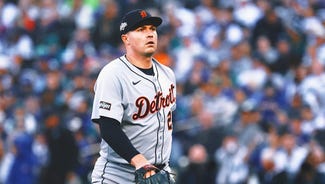
Have some baseball to go with your turkey
Global warming is going to ruin baseball's postseason - unless Bud Selig and his TV partners do it first. That highly unscientific theory came to me at the World Series last October on an ice-cold night in Philadelphia, right after the commissioner took the unprecedented step of suspending Game 5 between the Tampa Bay Rays and the host Phillies in the sixth inning. It was 11:10 p.m. EDT with a temperature in the low 40s. A steady downpour made it feel much colder and left puddles in the infield from which a golfer would have taken a free drop. Enough rain leaked into the batters' helmets to make them feel like aquariums. With the forecast calling for more of the same for the next few days, Selig vowed at a news conference moments later not to leave town before Game 5 was finished, no matter how long it took. "We'll stay here," he said, in a rare moment of conviction, "if we have to celebrate Thanksgiving here." That might be more than an empty threat. Selig said in a telephone interview Thursday from his office in Milwaukee that he can't shorten the schedule because neither the owners nor players would support it. Nor can he shift a few postseason games to daytime hours, where weather might be less of a factor, because Fox isn't likely to go along. The one thing he did volunteer to change was to "be more cautious than ever" about starting play on nights like Game 5 last year in Philadelphia. "I do worry about what those conditions do to our game. I've been worrying about it for 30 years," he said. "I'm already here a lot later than I wanted to be, watching and worrying about the weather tomorrow night in New York. "But," Selig added, "there's just no practical solution to it." More on that in a moment. The World Series could end later this year than ever before: Nov. 5 if it goes the distance. The regular season started a week late to accommodate the World Baseball Classic, which is scheduled once every three years. Even so, we've already endured three of the coldest series in the past quarter-century in the last five years, with last year's debacle edged out only by the St. Louis-Detroit finale in 2006 for the coldest during that span (average temperature: 48.6 degrees). It's way too early to call that a trend, and we're not about to get into a debate on global warming here. But you don't have to be a weatherman to know which way the wind blows in the Midwest and Northeast this time of year. Cold. So while Selig doesn't have a rooting interest, at least not officially, any neutral fan with half a brain and a hankering to see games that look like baseball rather than hockey has to be rooting for the Dodgers and Angels in the league championships. The NLCS between the Phils and Dodgers started Thursday night in Los Angeles, with a temperature of 78 and no chance of rain. The ALCS between the Angels and Yankees opens Friday, with the forecast calling for wind, rain and 40-degree temperatures that will make it feel like 25. "All I'm going to say about having the two California teams still in it is that it means a few games I won't have to worry about," Selig said. "The only outcome I'm rooting for is that the three series we've got left all go six or seven games." If the commissioner gets his wish, chances are good he'll be wearing a parka when it's granted. And he better get used to the feeling. Since 2000, three of the five teams playing host to the most postseason baseball games have been located in cold-weather cities: New York (41), St. Louis (31) and Boston (26); Los Angeles and Arizona tied for fourth with 16 each. There's every reason to believe the Yankees, Cardinals and Red Sox will continue to hold a prominent place in the postseason rotation. "I don't disagree with your point," Selig said. "It's always been a gamble. There's just no pragmatic solution, because believe me, we've been looking at it for years." Moving the World Series to a neutral site, as the NFL does with the Super Bowl, is out of the question - "that would be an unmitigated disaster," Selig said. Shortening the regular season can't be done unilaterally because the collective bargaining agreement calls for 162 games. "I brought up a motion to cut the season at owners meeting 20 years ago and couldn't get a second," Selig recalled. "And there's even less interest in it now." Baseball agreed two years ago to add a handful of off-days to the schedule because its TV partner wanted a midweek Series start rather than the traditional Saturday night, because that's generally the lowest-rated night of the week. It abandoned postseason day games long ago for the very same reason. It's not much, but the only thing Selig can do is try to get a few of those days back by talking tough to Fox, and there's little chance of that happening. "I know people are critical of the schedule, but there are a lot of variables," he said. "But I'm also going to be very, very concerned with the quality of play. I always have." Stay tuned. And if you're lucky enough to be headed to the ballpark for the games, don't forget a scarf. --- Jim Litke is a national sports columnist for The Associated Press. Write to him at jlitke(at)ap.org










